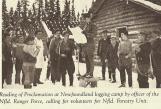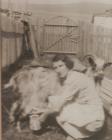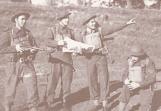1
After the declaration of war on the 3rd of September,1939, Newfoundland's Commission of Government advised the British authorities that Newfoundland was prepared to assist in the war effort. On October 29th, the Governor of Newfoundland issued a proclamation calling for a force of 625 volunteers to serve in the Royal Navy.3
Near the end of October of that year, there was a shortage of pit props needed for coal mining. The British Government called upon Newfoundlanders again to request pit prop cutters to address this urgent need. On November 17th, 1939, the Commissioner of Newfoundland announced the need for 2000 volunteers to log in the British Isles. This force would form the Newfoundland Overseas Forestry Unit.4
The recruitment effort for these volunteers began after November 19th by various branches of the forestry division assisted by officers of the Newfoundland Ranger Force stationed in rural areas. Because of the urgency the recruitment focused on mass populated and accessible areas such as the Avalon Peninsula, Central Newfoundland and the West Coast. Remote areas such as the South Coast and the Northern Peninsula were not visited in this first recruitment, that was to happen later. At the end of the first recruitment effort, 2,150 men had volunteered. These volunteers signed contracts committing them to work for six months in the British Isles.At the end of the six month contract some of the men planned to enlist in the British Armed Forces but the British Government embarked on a vigorous campaign to convince members of the unit to stay on. There were plenty of men for the Army, but only the men of the Forestry Overseas Unit could do this vital work. As a result approximately 50 percent of the members of the unit re-engaged for periods of three months to the duration. The other half enlisted in the British Armed Forces or retuned home.
7
The British Government again called for 1000 more volunteers from Newfoundland but the commitment requested was for service until the war ended. It was this second recruitment effort that would see recruiters travel throughout Newfoundland including the South Coast and the Northern Peninsula. This is when 103 men from Bay d'Espoir enlisted. In the end over 1400 men went to Scotland.9
While the men were gone, back in Newfoundland the women had to continue on with daily chores such as cutting wood, tending gardens and livestock, as well as caring for the children. In addition to these everyday chores, the women knit socks, mufflers (scarves) and cuffs (mittens with a trigger finger) to send overseas to their men.10
The volunteers of the Newfoundland Overseas Forestry Unit were paid $2 per working day or $12 per week, and were provided free board, transportation, accommodations, and medical care. Half of their wages were sent home to their families in Newfoundland. A consignment of clothing, footwear, and tools was issued to the loggers and the cost was deducted from their wages. The men were paid half-pay for days lost due to illness or accidents. Their pay would begin on the day they left their homes and cease when they returned home. At first the men worked ten hour days, however, by 1940 the work week was reduced from 6 to 5 ½ days per week with Saturday afternoons free. The basic wage stayed in effect until 1944, after which they received a 20 percent increase to $2.40 per day. By this time the minimum rate for loggers in Newfoundland was $5.30 per day.The camps were similar to those operated by the Newfoundland paper companies during that period and varied in size from 30 to 100 men per camp. Camps consisted of a cookhouse, bunkhouse (20 men per building), washroom, recreation hut, forepeak (staff quarters and office) and other small buildings. There were 71 camps in total.
Newfoundlanders found the adjustments hard. Sawmill equipment was in short supply and there was strict rationing of supplies. Food was also an adjustment. Back home, Newfoundlanders were accustomed to a diet of salt fish, salt pork, salt beef, bologna, hard bread and beans in the forest camps. These things were virtually impossible to obtain in Scotland. Most items such as tea, sugar, eggs, butter and fresh meat were rationed. The only items readily obtainable were bread, milk, vegetables and oatmeal. Game such as rabbit, hares and venison (deer) were not rationed so they became an important part of the everyday diet.





